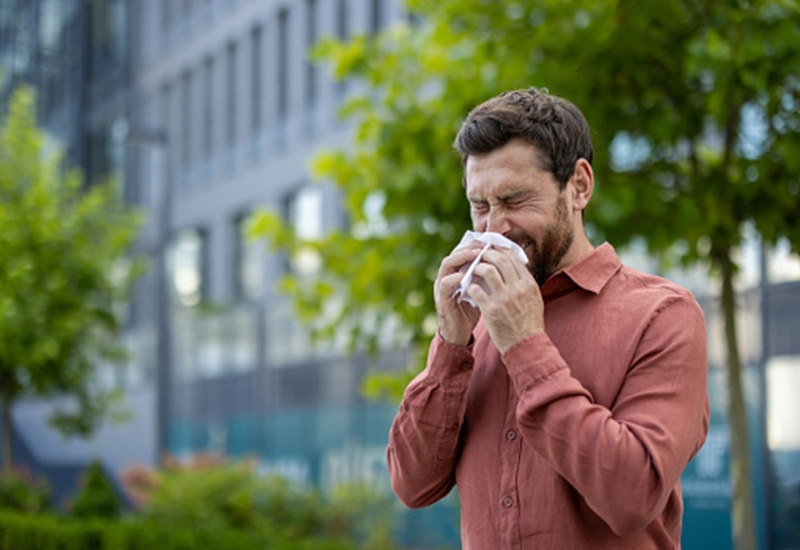Summer and Spring Allergies: Potential Triggers and HVAC’s Role in Preventing Them
Summer and Spring Allergies: Potential Triggers and HVAC’s Role in Preventing Them
Are your allergies worse during the spring and summer? You’re not alone. Warmer months bring sunshine, but they also cause seasonal allergies, sneezing fits, runny noses, and itchy eyes. The good news is your HVAC system can help reduce allergy symptoms and improve indoor air quality when properly maintained. Grissom Heat & Air is Knoxville’s leading HVAC specialist, and we’re here to ensure you can enjoy an allergy-free home. Below, we explore common causes of summer allergies, how your HVAC system can help, and what steps you can take to enhance your home’s air quality.

Common Allergy Triggers in Spring and Summer
Before discussing how your HVAC system can combat allergies, it’s important to understand what causes summer allergies and springtime reactions. The months of blooming flowers and warm breezes also bring:
Pollen
Pollen is one of the biggest culprits behind spring and summer allergies. Trees, grasses, and weeds release microscopic pollen grains into the air during these months. When inhaled, pollen can cause hay fever, leading to sneezing, congestion, and itchy eyes. Knoxville residents may notice significant pollen spikes during the spring, making even short outdoor trips uncomfortable.
Mold and Mildew
Warm and humid weather creates the perfect environment for mold and mildew to thrive. Mold spores can be found indoors in damp areas like basements or outdoors on plants and in soil. If inhaled in high concentrations, they can irritate those with allergies.
Dust Mites
Dust mites may be active throughout the year, but they are most common in summer months. These microscopic bugs live in household fabrics, such as bedding, carpets, and curtains. They’re known to trigger allergic reactions in sensitive individuals.
Pet Dander
While pet dander isn’t seasonal, many homeowners retreat indoors when the temperatures are extremely high. Dander mixes with airborne allergens like pollen, further worsening sufferers’ symptoms.
The Role of HVAC Systems in Managing Allergies
Your HVAC system is more than a source of cool comfort during Tennessee’s hot summers. It’s also a powerful tool for improving indoor air quality. When well-maintained, it’s your first line of defense against allergies. It does so through:
- Filtration – Your HVAC system contains air filters that capture dust, pollen, and other airborne particles as air circulates through your home. High-quality filters such as HEPA (High-Efficiency Particulate Air) filters are even better at trapping allergens.
- Humidity Control – Excess humidity encourages mold growth and dust mites, making allergies worse. Your HVAC system can manage indoor air moisture levels, keeping humidity in the optimal range of 30-50%.
- Ventilation – Modern HVAC systems enhance ventilation, cycling fresh air into your home while removing stale indoor air. This reduces dust buildup and ensures allergens don’t accumulate in your living space.
HVAC Maintenance Tips to Prevent Allergies
Routine HVAC maintenance is critical for keeping allergens out of your home. By staying proactive about your system’s efficiency, you can ease allergy symptoms and breathe more freely year-round. Here are a few simple steps to prevent or limit allergies:
- Replace Air Filters Regularly – Allergy sufferers should change HVAC filters every 1-3 months or more frequently during pollen-filled seasons. Consider upgrading to HEPA filters for maximum filtration.
- Clean Air Ducts – Air ducts distribute cool or warm air throughout your home. However, they can also harbor dust, mold, and other allergens. Schedule HVAC duct repairs or cleaning with Grissom Heat & Air to improve airflow and reduce allergen buildup.
- Inspect and Service Your HVAC Unit – Make routine inspections a priority. Regular HVAC repair services can address minor issues before they escalate, ensuring your system runs efficiently and keeps allergens in check.
- Keep Outdoor Units Clear – Outdoor HVAC units can collect pollen and debris. Ensure they are clean and free of obstructions to maintain efficiency.
HVAC Upgrades for Improved Air Quality
If allergy symptoms persist despite regular maintenance, it may be time to explore system upgrades. The Grissom Heat & Air team is happy to discuss these with you and find the perfect fit for your home. Modern advancements in HVAC technology include solutions specifically designed to improve indoor air quality, such as:
- Air Purifiers – Built-in air purifiers enhance HVAC systems by removing allergens that smaller filters might miss. These systems can significantly reduce airborne irritants in your home.
- UV Light Systems – UV lights installed in HVAC systems can kill bacteria, mold, and pathogens that circulate through the ductwork, preventing them from worsening allergy symptoms.
- Dehumidifiers – While HVAC systems can manage humidity, standalone or integrated dehumidifiers provide extra control for muggy environments like Knoxville.
- Zoning Systems – Allergy sufferers can benefit from zoning systems that allow independent control of temperature and airflow in different areas of the home, minimizing allergen hotspots.
When You Should Contact a Professional for HVAC Maintenance
Sometimes, even with regular maintenance, you can’t escape allergy symptoms. This could signal larger problems like mold in your ducts, improper system installation, or an inefficient design. But Grissom Heat & Air can help with anything from repairs to system overhauls and HVAC installation. Contact our team if:
- Your indoor air smells musty
- You notice inconsistent airflow or increased allergy symptoms
- Your HVAC system hasn’t been serviced in over a year
Contact Grissom Heat & Air for HVAC Expertise Today
Spring and summer can bring more than just warmer weather. They can also cause aggravating allergic reactions. However, a well-maintained HVAC system will improve indoor air quality and promote comfort and easy breathing. Regardless of the HVAC services you need in Knoxville, Grissom Heat & Air is the team to call. Contact us today to schedule a consultation and take the first step toward an allergy-free home.
